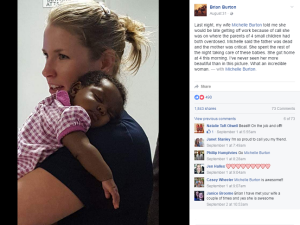This photo of an officer comforting a baby went viral. But there’s more to the story.
By the time Michelle Burton and a dozen other Birmingham, Ala., police officers arrived at an apartment, it was too late to save a 30-year-old man, who died of an apparent drug overdose.
On the couch lay a 35-year-old woman, slack and unresponsive, but with a faint pulse. Paramedics on the scene administered a dose of Narcan, a fast-acting opioid antidote, before rushing her to the hospital.

Then there was the matter of the couple’s shaken children: a 7-year-old girl, a 3-year-old boy, a 2-year-old boy and a 1-month-old girl clad in a tiny purple gingham dress.
They were being comforted by next-door neighbors, the same ones who had dialed 911 earlier after hearing the older girl crying out: Help! We can’t wake mom and dad up.
Protocol dictated that the children would need to be taken to the South Precinct, then to family court and finally to the custody of Child Protective Services at DHR, the Alabama Department of Human Resources.
It was already 9 p.m. Aug. 30. Burton, less than two hours away from finishing her usual shift, let her husband know she was going to be home late from work that day.
“It was horrible,” Burton told The Washington Post. “It was a very sad situation.”
But it was not, she said, the first such situation they found themselves in.
An officer-in-training with Burton lent the two boys his flashlight; soon, the toddlers were running around, shining it in people’s faces.
The 7-year-old was quieter, Burton said. The officer asked if she needed anything.
The girl asked if someone could sign her homework, so she could turn it in to her teacher the next day.
“That broke my heart,” said Burton. “She said, ‘I did my work.’ She pulled it out and showed it to us. It was math homework, (like) ‘Which number is greater? Which number is odd or even?’ … I told her, ‘Sweetie, you probably won’t have to go to school tomorrow. … But where you’re going is going to have everything you need.’”
In the apartment, Burton found an unopened can of infant formula and a baby bottle; she grabbed both.
At the precinct, officers bought whatever the other kids wanted to eat from a vending machine. There, Burton removed her vest and other police gear so she could comfortably hold the infant and give her a bottle. It had to have been hours since she had been fed, Burton thought.
“A lot of us are parents,” Lt. Sean Edwards, Birmingham police spokesman, told The Post. “We just go into parent mode and not necessarily police mode. … Officer Burton, she just really wanted to grab the baby and just cuddle the baby.”
So she did. Soon, the infant was sound asleep on Burton’s shoulder.
At some point, someone in the precinct captured a photo of the tender scene, which Burton later showed her husband.
Edwards said he wasn’t surprised by Burton’s actions. The department has more than 800 sworn officers, and they have to be prepared for dozens of different scenarios, he said.
“It’s a part of our job, it’s a part of what we see, what we do. Our concern is to preserve, to protect,” he said. “We find ourselves in a lot of situations like this.”
[I was my husband’s caregiver as he was dying of cancer. It was the best seven months of my life.]
Maybe it’s because Burton, 33, is a mother of two boys herself, or perhaps it’s just that she’s good at comforting children. She’s often tapped to go to car accidents and other incidents where kids might be left alone.
“They’re like, ‘Let’s call Burton because this is what she does.’ It happens a lot,” Burton said. “But it’s not just me. I actually have pictures of officers, male officers, like making baby bottles. … We do what we have to do when we have to do it.”
The rest of that night was a blur, but Burton said she can’t forget the number of people who came together to make sure the four children were safe. A social worker — who had just welcomed her own newborn grandchild — showed up to the precinct and stayed with them until 3 a.m. the next day, when they finally were placed in the care of Child Protective Services, Burton said.
Burton finally went home at 4 a.m. and promptly fell asleep.
While she was sleeping, Brian Burton, who also is in law enforcement, posted the photo of his wife and the baby on Facebook early the next morning.
“Last night, my wife Michelle Burton told me she would be late getting off work because of call she was on where the parents of 4 small children had both overdosed,” Brian Burton wrote in his post. “She spent the rest of the night taking care of these babies. She got home at 4 this morning. I’ve never seen her more beautiful than in this picture. What an incredible woman.”
Michelle Burton woke up to find hundreds of notifications on her phone. The photo had been shared more than 1,000 times.
She said she’s not surprised by her husband’s post, because he has always been her biggest supporter.
“He’s very proud of who I am and what I do,” Burton said. “What surprised me is just [how much] positive that seems to have come out of it.”
AL.com wrote about the viral photo. For the next several days, Burton said she couldn’t go anywhere without getting stopped.
Someone at a gas station recognized her: Are you that officer? the stranger had asked. What happened with the kids?
While at the bank, another woman simply walked up to her and gave her a hug. Birmingham may have the largest population in Alabama, but at its heart, it’s a small town, Burton said.
“I’m overwhelmed about the whole thing,” Burton said. “I don’t want people to think that it’s only me that does this. We all do things like this. … It was one of those nights where everybody worked together and everybody did what they needed to do.”
The Alabama Department of Human Resources does not give out identifying information on children placed in state custody and thus could not provide updates on the four children Birmingham police said were placed in the care of Child Protective Services last week.
However, DHS spokesman Barry Spear told The Washington Post on Tuesday that the first priority in all cases is to keep children within their own family — grandparents, aunts, uncles and so on.
“The general procedure in cases where children are removed from a home due to an arrest or a death in the family where police go in [is] we look for relatives if there’s any that can be quickly identified and found to be suitable,” Spear said. “If that can’t be done, then we put children in foster care.”
Inspired Life newsletter
Weekly inspiration to improve your life.
Sign up
DHR does not keep statistics on how long children typically spend in the foster-care system, Spear said. Sometimes, it is only one or two nights. Often, a foster family is called in the middle of the night in an emergency situation. In some instances, a state worker keeps a child until the next morning.
“We make an effort to find the foster parents as soon as possible,” Spear said. “And we do whatever we can to keep siblings together.”
Currently there are about 5,200 children in foster care across Alabama, according to DHS. There is a constant need for foster families in the state, but “it’s not for everybody,” Spear said. “What’s important is people get the information they need so they know if it might be something they’re interested in.”


Recent Comments